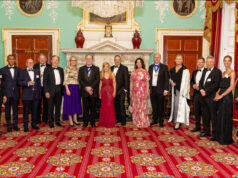David Jinks, Head of Consumer Research at the international parcel broker ParcelHero, says the UK will turn towards the BRICS nations, and in particular South Africa, following a ‘hard’ Brexit.
The UK’s faltering steps towards quitting the European Union (EU) are showing no clear direction yet. Britain could leave the EU and still maintain access to the EU’s Single Market and the Customs Union: that would be a so called soft Brexit. However, it is highly likely access to the Single Market would mean accepting free movement of people from the EU to the UK; and that’s a huge stumbling block for many Brexiteers. Which means a hard Brexit is still very much on the cards.
A hard Brexit would likely leave Britain trading with the EU under World Trade Organisation (WTO) rules; and that would mean tariffs at EU-UK borders, together with increased paperwork and border checks. In 2016, about 44% of the UK’s exports in goods and services went to EU countries; but under a hard Brexit these exports would cost considerably more in Europe and EU imports to the UK would rise in price similarly.
Small wonder many UK business are starting to brick together an approach to new markets. Some of the most lucrative are the so-called BRIC nations, which have now -significantly – become BRICS with the addition of South Africa to their ranks.
Because of the comparative ease of trading with the EU, British business have perhaps been slower than some other countries in seeing the huge potential of Brazil, Russia, India, China and, notably, South Africa. But Britain outside the EU will be free to pursue its own trade deals; and the BRIC Nations will be a key target.
It’s fair to say all the BRICS have both their attractions and challenges for the UK. How does the UK view each of the nations?
Brazil is the world’s tenth largest economy. Since opening its market to imports in the 1990s, Brazil has gradually reduced its import tariffs and trade barriers. But Customs procedures can be slow, with a significant number of work to rules recently, and some UK SMEs report difficulties with returns and non-payments selling directly to customers.
Russia was the world’s ninth largest economy by GDP in 2014; and has improved to 62nd in the World Bank’s ‘Ease of Doing Business’ ranking. Over 5,800 UK traders exported goods to Russia in 2013. However, couriers such as ParcelHero are not allowed to ship directly to Russian domestic addresses; but only to registered businesses
India is one of the world’s fastest growing economies. The UK exported goods worth £6.35 billion and services valued at £2.24 billion to India in 2014, and is the third largest investor in the country. However, there are barriers to trade and investment because of regulatory constraints, local sourcing requirements and import tariffs. For example, the tariff on a CKD car kit in India is 125%!
China is the great economic success story of the past 30 years. It’s now the world’s largest economy and a huge and expanding market for UK businesses. But China is not one single market: there are different regional economies and economic hubs. UK Businesses need to understand the regional economic and cultural differences.
So we turn to the new kid on the BLOC(S): South Africa. South Africa has a well-developed economic infrastructure and significant opportunities in its emerging markets. It also has a fast-growing new middle class. The UK is a valued trading partner for South Africa, with annual bilateral trade worth just under £10 billion. UK exporters are also developing ties with Commonwealth countries, and South Africa and India straddle both these markets.
Of course, British businesses are not blind to recent issues in the country, with ratings agencies S&P and Fitch officially downgrading South Africa to junk status earlier this year, threatening higher interest rates and inflation for ordinary South African consumers. And even the UK Government’s site ‘doing business in south Africa’ warns of a high crime rate and poor transport infrastructure in places.
And there’s no getting around the fact that South Africa has a complex import process, so UK businesses would face similar challenges trading with it to doing business with the EU post Brexit. The South African Revenue Service (SARS) defines approximately 90,000 product tariff codes that are strictly enforced on all imports. Customs South Africa (Customs SA), a division of SARS, requires that you register with its office to get an importer’s code. This can cause delays while clearing goods.
None the less, South Africa seems a natural fit with the UK in terms of trading links. UK exports of goods and services with South Africa rose by 25% in the last decade; while South Africa’s exports into the UK have increased by over 5% annually for the last decade.
In January this year the UK’s Brexit minister, Dr Liam Fox, met with South Africa’s Minister for Trade and Industry, Dr Rob Davies. Dr Fox, said: ‘South Africa is a key trading partner to the UK – a long-standing, strong and strategic ally for the United Kingdom in Africa and internationally. It is our largest export market in Africa; the largest economy in the southern Africa region and a fellow G20 member. South Africa is also the largest recipient of UK foreign direct investment in Africa, accounting for 30% of total UK foreign direct investment (FDI) in 2014, a value of £13.1 billion.’
And Dr Fox was quick to point out post Brexit opportunities. He stated: ‘As we become an even more outward looking country, we will continue building on our relationship with South Africa and today’s meeting was an opportunity to discuss how we progress that.’
Dr Rob Davies was equally enthusiastic. He explained: ‘The UK is a historical and strategic trade and investment partner for South Africa and remains a key market especially for agriculture exports accounting for over 20% of SA’s exports of wine and 30% of fruit exports globally. The UK is the biggest destination in the EU for South African investment, accounting for 30% of SA investments into Europe. Furthermore, 46% of SA’s global investment originates from the UK.’
And South Africa’s Dr Davies was equally positive about the relationship post Brexit. He explained: ‘We must ensure that we have a predictable trade and investment environment for mutual benefit for both parties. As we work to achieve this, South Africa looks forward to discussing how our trade post-Brexit could build on the recently concluded Economic Partnership Agreement with the EU.’
So the foundations are in place for strong trading relationships between Britain and the BRICS nations post Brexit; and with South Africa in particular, as an easy place to do business.
For more information on shipping to South Africa and the latest prices, visit: https://www.parcelhero.com/en-gb/international-courier-services/south-africa-parcel-delivery










